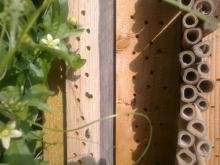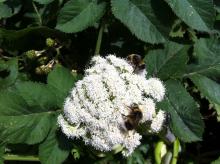The value of insect pollination to crops has been estimated at approximately £400 million, due to increases in yield and quality of seeds and fruit. In the Autumn Defra is planning on publishing the National Pollinator Strategy for England, along with advice on how to manage different landscape types, from farmland to urban spaces, to support pollinators. A recent conference organised by Plantlife, the Rare Breeds Survival Trust and the Wildlife Trust outlined five simple actions to help pollinators:
- Grow more nectar- and pollen-rich flowers, shrubs and trees
- Leave patches of land to grow wild
- Cut grass less often
- Avoid disturbing or destroying nesting or hibernating insects
- Think carefully about whether to use pesticides
For more information and to view a short film on the importance of pollinators please visit the Wildlife Trust webpage.
On the subject of bees, The British Ecological Society and Amateur Entomologist’s Society organised a highly informative conference at the end of October, where Buglife unveiled their most recent ambitious project called ‘B-lines'. Just like people can't live without roads and train-lines, so too bees and other wildlife need travel networks to get around and survive. Through GIS modelling of high-valued invertebrate habitat and working with local partners, BUGlife are begining to identify the least-cost routes for pollinators across the UK (still ongoing). London has been mapped, alongside parts of Yorkshire and Cumbria. Find out more at: https://www.buglife.org.uk/campaigns-and-our-work/habitat-projects/b-lines and for the London Map at: http://www.wildlondon.org.uk/news/2014/11/04/sweet-news-london%E2%80%99s-pollinators

